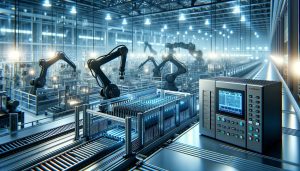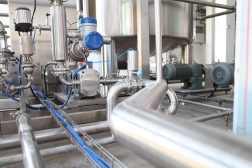In the dynamic landscape of Industry 4.0, where technological advancements are reshaping the way businesses operate, the integration of Robotic Process Automation (RPA) stands as a pivotal force. As companies strive for enhanced efficiency, reduced costs, and streamlined operations, the synergy between RPA and Industry 4.0 is revolutionizing the manufacturing and logistics sectors.
For companies seeking to stay competitive in the evolving landscape of industry 4.0, the strategic integration of RPA is paramount. Mobile Industrial Robots (MIR), a leading provider of Autonomous Mobile Robots (AMRs), offers tailored solutions to enhance warehouse and logistics operations. Explore how AMRs optimize workflows, internal logistics, labor costs, and time-consuming tasks.
Tracing the Path to Industry 4.0
Industry 4.0, coined in 2011 by the German government, represents a revolutionary phase in manufacturing history. Stemming from a series of industrial revolutions, including the mechanization of the First Industrial Revolution, mass production of the Second and digital integration of the Third, Industry 4.0 embraces the convergence of cyber-physical systems, the Internet of Things (IoT) and advanced technologies like artificial intelligence. This paradigm shift envisions smart factories where interconnected systems collaborate intelligently, marking a new era of efficiency and automation.
The journey to Industry 4.0 has been punctuated by technological milestones such as the widespread adoption of computers in manufacturing during the late 20th century and the increasing prevalence of digital connectivity. Today, the industrial landscape is characterized by the seamless integration of data analytics, cloud computing, and IoT, fostering a dynamic environment where machines communicate and adapt in real-time, propelling industries towards unparalleled levels of productivity and innovation.
A Paradigm Shift in Manufacturing
The advent of Industry 4.0, synonymous with the Fourth Industrial Revolution (4IR), marks an epochal shift in the landscape of manufacturing. This paradigmatic transformation is propelled by the convergence of cutting-edge digital technologies, heightened connectivity, and the integration of intelligent automation. At its essence, Industry 4.0 envisions the emergence of smart factories, where cyber-physical systems collaborate seamlessly, orchestrating a symphony of data exchange to inform and guide decision-making processes.
This era of pervasive digitalization is not merely a leap forward; it’s a revolutionary leap into an era where RPA stands as a fundamental building block, fortifying the foundations of smart manufacturing. In this era of innovation and interconnectedness, RPA emerges as a pivotal force, redefining the very fabric of manufacturing processes by infusing them with unprecedented agility and efficiency.
The Convergence of RPA and Industry 4.0
Robotic Process Automation, a subset of artificial intelligence, involves the use of software robots to automate repetitive tasks, liberating human resources for more complex responsibilities. In the context of Industry 4.0, RPA becomes the driving force behind optimized workflows, ensuring that routine and time-consuming tasks are executed with precision and speed.
From automating data entry and inventory management to streamlining order processing, RPA brings unparalleled efficiency to manufacturing workflows. The seamless integration of RPA technologies ensures that data flows seamlessly across various systems, minimizing errors and enhancing overall productivity. Companies adopting RPA in their Industry 4.0 initiatives witness a significant reduction in operational costs while achieving higher throughput.
Internal Logistics Reinvented
The impact of RPA extends beyond manufacturing processes, infiltrating the realm of internal logistics within warehouses and distribution centers. As companies navigate the complexities of modern supply chains, the strategic implementation of RPA ensures that internal logistics are not only optimized but also responsive to dynamic demands.
In the logistics sector, RPA plays a crucial role in automating order fulfillment processes, inventory tracking, and even route optimization for goods transportation. The result is a more agile and adaptable internal logistics system that can swiftly respond to changes in demand, ensuring that products reach their destinations with speed and precision.
The Strategic Investment in Automation
One of the most significant advantages of Industry 4.0 manufacturing is the strategic reduction in labor costs. While concerns about job displacement are valid, the focus here is on augmenting human capabilities rather than replacing them. RPA handles routine tasks, allowing human workers to concentrate on more complex and strategic aspects of their roles.
By automating repetitive tasks that are prone to human error, RPA not only improves accuracy but also ensures consistent performance 24/7. The result is a substantial reduction in labor costs, enabling companies to allocate human resources strategically and invest in upskilling employees for higher-value roles.
Trustworthy Integration
As companies embark on the journey of industry 4.0 applications, trustworthiness becomes a critical consideration. The strategic partnership with a trusted provider, such as MIR, ensures that the integration process is seamless and aligned with the unique needs of each business.
RPA technologies, when implemented correctly, enhance operational efficiency without compromising the integrity of data or the reliability of systems. The robotic process automation industry 4.0 offers businesses the assurance that the solutions provided are reliable and secure, and contribute to the overall success of their Industry 4.0 initiatives.
Conclusion
In conclusion, the synergy between Robotic Process Automation and Industry 4.0 is reshaping the manufacturing and logistics landscape. By optimizing workflows, reinventing internal logistics, and strategically lowering labor costs, RPA becomes a catalyst for efficiency in the Fourth Industrial Revolution.
As companies seek to navigate the complexities of Industry 4.0, MIR stands as a reliable partner, offering Autonomous Mobile Robots that further enhance the transformative power of automation. Embrace a future of efficiency, precision, and innovation with the strategic integration of RPA and Industry 4.0 technologies.

























